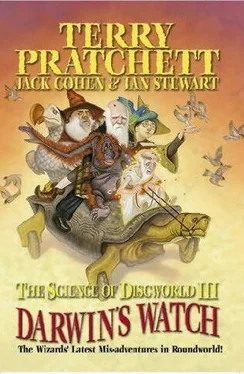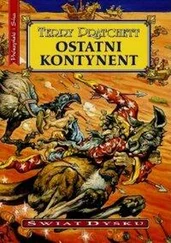Terry Pratchett - Darwin's Watch
Здесь есть возможность читать онлайн «Terry Pratchett - Darwin's Watch» весь текст электронной книги совершенно бесплатно (целиком полную версию без сокращений). В некоторых случаях можно слушать аудио, скачать через торрент в формате fb2 и присутствует краткое содержание. Жанр: Фантастика и фэнтези, на английском языке. Описание произведения, (предисловие) а так же отзывы посетителей доступны на портале библиотеки ЛибКат.
- Название:Darwin's Watch
- Автор:
- Жанр:
- Год:неизвестен
- ISBN:нет данных
- Рейтинг книги:3 / 5. Голосов: 1
-
Избранное:Добавить в избранное
- Отзывы:
-
Ваша оценка:
- 60
- 1
- 2
- 3
- 4
- 5
Darwin's Watch: краткое содержание, описание и аннотация
Предлагаем к чтению аннотацию, описание, краткое содержание или предисловие (зависит от того, что написал сам автор книги «Darwin's Watch»). Если вы не нашли необходимую информацию о книге — напишите в комментариях, мы постараемся отыскать её.
Darwin's Watch — читать онлайн бесплатно полную книгу (весь текст) целиком
Ниже представлен текст книги, разбитый по страницам. Система сохранения места последней прочитанной страницы, позволяет с удобством читать онлайн бесплатно книгу «Darwin's Watch», без необходимости каждый раз заново искать на чём Вы остановились. Поставьте закладку, и сможете в любой момент перейти на страницу, на которой закончили чтение.
Интервал:
Закладка:
We can easily understand how such beliefs, bolstered as they are from within, have been retained throughout the generations. The promise of an afterlife, espoused by all the sensible people around you, makes many of this life's sorrows easier to bear. And, as we've seen in recent years, belief in a Paradise for those who die fighting for the faith in a Holy War makes you pretty well invincible. [1] Such invincibility is a side-effect of the memeplex's belief tactics, not a certification of the truth of the bomber's faith. Especially given that nearly all of those who share the bomber's faith (Islam, Catholicism ... ) deny that their beliefs justify killing unbelievers.
This plurality of theist beliefs, especially in today's mixed-up world with its different cultures and multicultures, encourages a more critical belief in authority, and usually a willingness to admit
[1] Although it does seem a little strange that Palestinian terrorists protect their genitals, for use in Paradise, when setting themselves up as suicide bombers.
commonality with other theists. Such common ground encourages the integration of different cultures. Many minorities are assimilated and disappear, but others react by emphasising their individuality. Some of the latter, like the Thuggee worshippers of the death goddess Kali in nineteenth-century India, and the recent al-Qaeda terrorists, gain temporary notoriety that seems to be a triumph of their faith. However, this is usually self-defeating in the longer term. In any event, the number of deaths is no comment, plus or minus, upon the truth of the beliefs that these thugs hold. The faith of these militant minorities sometimes gains sharpness and even subtlety, but it is usually subordinated to the day-to-day exigencies of the violent lives they lead.
Many great scientists, for example Galileo, were ridiculed when they proposed new insights into the natural world. Scientific crackpots often deduce that because their work is being ridiculed, they must be the new Galileo, but that doesn't follow. Similarly, men of violence often try to validate their `martyrdom' by comparing themselves to ancient Christians or ghetto Jews, and again the logic is flawed. There is no rational reason to accept any of their gods as part of the real universe, however helpful that belief might be to some people as regards day-to-day living. Despite that, many clever, honest people do feel that a God is necessary to their understanding of how everything is organised. Once a memeplex has caught you, it's hard to escape.
We have a little more sympathy with deists, who mostly seem to believe that the universe is extraordinarily complex, yet possesses an overall simplicity, and that this points to some celestial guardian who looks after the whole thing and gives it meaning. Ponder Stibbons and Mustrum Ridcully, in their different ways, edge towards deism; they want to feel that `someone' is at the helm. If challenged, deists usually deny the anthropomorphic character of this guardian, but they still retain a belief in the ability of individual people - perhaps individual `souls' - to relate directly with whoever or whatever is in charge. We personally doubt that such apparent interactions, whether attained by meditation or prayer, are more than selfdelusion. But we are happy to live on the same planet as people who believe that they are in direct contact with ultimate causality, however unscientific we may feel that belief to be.
There is a growing minority of thoughtful people who have given up on the idea of a personal, anthropomorphic God altogether. Some, particularly among Buddhists and Taoists, retain the mystical/metaphysical stance that is characteristic of religion, and consider the `scientific' world to be subservient to a mystical true picture more closely related to subjective experience. In contrast, those of us who were persuaded by Spinoza's rejection of an anthropomorphic God, not least because neither the universe nor an omnipotent deity can exist without being coextensive with everything there is, see the scientific view as exposing both the nature of god, if that is our belief, through the laws by which things work, and the workings of the universe itself.
Many scientists, particularly those whose endeavours relate closely to the real world, like geologists, astronomers, biologists, ecologists, and polymer chemists, avoid the mystical approach and see their own speciality as exemplifying a complex slice of the universe, with many emergent properties that are not predictable from the detailed substructure. Other scientists, particularly those devoted to reductionist explanations, like physicists, astrophysicists, physical chemists, molecular biologists, and geneticists, retain a version of the mystical approach, but try to explain higher level behaviour in terms of the substructure. Tellingly, many scientists who work at the `coal face' of the subject generally have a respect for the unknown possibilities that the universe might throw at them, whereas workers in more abstract realms like quantum theory have a tendency to go all mystical about their own understanding, or lack of it.
Most human attempts-at an explanation try to find a thin causal chain of logic and narrative, leading from things we accept to whatever it is we are trying to explain. This type of story appeals to human minds, but it is usually an oversimplification, and it leads to serious misunderstandings. The typical television science programme, where a single individual is held to be responsible for some big `breakthrough', paints a wildly inaccurate picture of the incremental process by which most scientific advances are made. Unicausal explanations make nice stories, but fail to capture the complexities of the real world. The most effective explanations are often very varied, and it's a good idea to find a lot of different ones, if they're available. Physicists searching for a unification of relativity and quantum theory should perhaps bear in mind the possibility that any unification may turn out to be less effective than the two separate theories, each safely confined to its own domain. Only if you can get several theories to compete, in your mental territory, can you begin to distil understanding.
THE GOD OF EVOLUTION
`DOING WELL BUT LOTS STILL TO BE DONE!' barked Ridcully, striding out of the magic circle into the Great Hall. `Everything all right, Mr Stibbons?'
`Yes, Sir. You didn't try to stop the God of Evolution talking to Darwin, did you?'
`No, you said we shouldn't,' said Ridcully briskly.
`Good. It had to happen,' said Ponder. `So all we need to do now is persuade Mr Darwin-'
`I've been thinking about that, Stibbons,' Ridcully interrupted, `and I have decided that you will now take Mr Darwin to meet our God of Evolution on his island,' said the Archchancellor. `It's quite safe.'
Ponder went pale. `I'd really rather not go there, sir!'
`However, you will, because I am Archchancellor and you are not' said Ridcully. `Let's see what he thinks of the wheeled elephant, eh?'
Ponder glanced at Darwin, still in the blue glow of stasis. `That's very dangerous, sir. Think of what he'll be seeing! And it would be quite unethical to remove the memories that-'
`I know I am Archchancellor, it's written on my door!' said Ridcully. `Show him his god, Mr Stibbons, and leave the worrying to me. Quickly, man. I want this all wrapped up by dinnertime!'
A moment after Ponder and Darwin left, a small boulder and quite a lot of sand appeared and slid across the tiles of the Great Hall.
`Well done, Mr Hex,' said Ridcully.
+++ Thank you, Archchancellor +++ Hex wrote.
`I was kind of hoping we'd get the chairs back, though.'
+++ I will see what I can do next time, Archchancellor +++
And on Mono Island, Charles Darwin picked himself up from the beach and stared around.
Читать дальшеИнтервал:
Закладка:
Похожие книги на «Darwin's Watch»
Представляем Вашему вниманию похожие книги на «Darwin's Watch» списком для выбора. Мы отобрали схожую по названию и смыслу литературу в надежде предоставить читателям больше вариантов отыскать новые, интересные, ещё непрочитанные произведения.
Обсуждение, отзывы о книге «Darwin's Watch» и просто собственные мнения читателей. Оставьте ваши комментарии, напишите, что Вы думаете о произведении, его смысле или главных героях. Укажите что конкретно понравилось, а что нет, и почему Вы так считаете.












